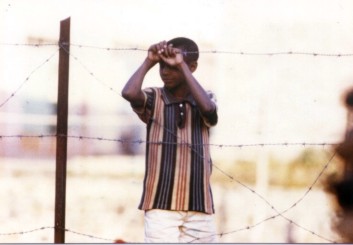| The
institutionalization of racial discrimination in South Africa. |
 |
|
|
South Africa came
under the control of the Dutch and the English during the era of colonialism.
After independence from England, apartheid laws were enacted beginning
in 1948, to give the "National Party" control over the society. Every
person was required to register and be classified as white, black, or
colored; the "colored" category included Indians, Asians, and anyone of
mixed descent. Marriage between whites and non-whites was illegal. Access
to non-black areas was tightly controlled and all blacks were required
to carry pass books. Blacks were not allowed to vote. Later on, "homelands"
were established, and each black person was assigned to live in the area
of his or her supposed origin; passports were required for entry into
other parts of South Africa, even for employment. Protests or non-compliance
were severely punished; thousands of people died in prisons and many were
tortured. Bishop Desmond Tutu was involved
in the anti-apartheid movement. Apartheid finally ended with the election
of Nelson Mandela as South Africa's first black president in 1994.
|